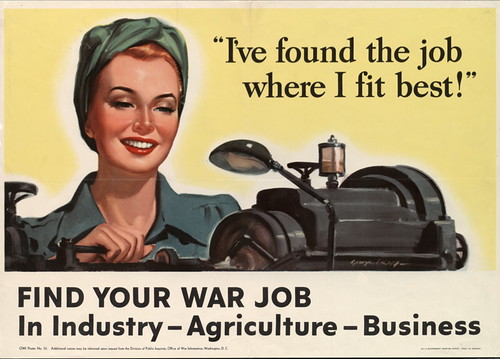MURDER, POLITICS, AND THE END OF THE JAZZ AGE
by Michael Wolraich

Anyone who was here state side during WWII can tell you of the rationing that went on. Everything was rationed. From bread to tires. They can also tell you that no matter what industry you were in, you were doing defense work. WWII took this country from nearly 30% unemployment to 0 unemployment over night. New businesses formed overnight to meet the demands. Struggling businesses like Willys Motors became major contractors.
There were factories and corporations making each others products to meet the demand of the military. RCA, Sromberg Carlson and Bendix all making the same radios. Willys and Ford made the Jeeps. Whole towns grew up from nothing to support new ship and arms factories. One could say that nearly every corporation became a wholly owned subsidiary of USA Inc. The technology of the time expanded at a break neck pace and the war paid for nearly all of it.
When WWII came to an end in 1945 the so called Cold War against what was called Communism began as well as a new war to fight it. Korea and the cold war kept many of these plants humming right along. And new defense systems needed new advances which meant lots of dollars for research and development and nearly all of it payed for by Uncle Sam. Working for a defense contractor - and at that time nearly all the major corporations were defense contractors - meant you could get what ever new and necessary equipment you needed to advance your project. And a lot of this R&D made it's way to the products that were sold to the general public as well.
Pretty sweet deal wouldn't you say. Putting a good part of your research staff's overhead on the government's bill. And if the US military stopped being interested, you could also sell it to France or Egypt or Iran or Iraq or Israel or some South American country. And nearly every technical advance we saw had it's origin or was advanced in some way through military material need - and I include NASA here - . From television - improved for WWII, to computers - ENIAC for WWII became IBM.
Very few people complained about the merger of government and industry except president Eisenhower who used the euphemistic term Military Industrial Complex. Actually a form of codependency. Where the US needed this arrangement just as much as industry did.
Reagan attempted to break it up after the fall of the Soviet Union but it was by then far to ingrained and in fact still flourishes as can bee seen by this list of the top 20 contractors. Here is a PDF that goes into even greater detail.
And by what we have learned from Matt Taibbi and Ives Smith and others, this compact has been expanded to include the finance arena as well. With the Federal Reserve and Treasury's union with Wall Street.
Too look on this as separate entities to me seems just a but naive. We complain about the revolving door in Washington but to me it simply looks like intra-office advancement. Is it any wonder that there is little interest in Washington to change any of this ? That both parties like the idea of a corporate/government arrangement.
If you want to understand what we are up against you would be wise to read Post-Soviet Lessons for a Post-American Century by Dmitry Orlov. About a two thirds of the way down is the section Similarities between the Superpowers.
It gives a good insight into how we came to mimic the same kind of political/economic paradigm the Soviets used and why it is as difficult now for any but the two main parties to get elected as it is for other parties in Russia now.